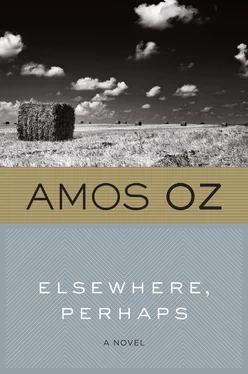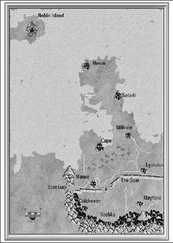Amos Oz - Elsewhere, Perhaps
Здесь есть возможность читать онлайн «Amos Oz - Elsewhere, Perhaps» весь текст электронной книги совершенно бесплатно (целиком полную версию без сокращений). В некоторых случаях можно слушать аудио, скачать через торрент в формате fb2 и присутствует краткое содержание. Год выпуска: 1985, Издательство: Mariner Books, Жанр: Современная проза, на английском языке. Описание произведения, (предисловие) а так же отзывы посетителей доступны на портале библиотеки ЛибКат.
- Название:Elsewhere, Perhaps
- Автор:
- Издательство:Mariner Books
- Жанр:
- Год:1985
- ISBN:нет данных
- Рейтинг книги:4 / 5. Голосов: 1
-
Избранное:Добавить в избранное
- Отзывы:
-
Ваша оценка:
- 80
- 1
- 2
- 3
- 4
- 5
Elsewhere, Perhaps: краткое содержание, описание и аннотация
Предлагаем к чтению аннотацию, описание, краткое содержание или предисловие (зависит от того, что написал сам автор книги «Elsewhere, Perhaps»). Если вы не нашли необходимую информацию о книге — напишите в комментариях, мы постараемся отыскать её.
Elsewhere, Perhaps — читать онлайн бесплатно полную книгу (весь текст) целиком
Ниже представлен текст книги, разбитый по страницам. Система сохранения места последней прочитанной страницы, позволяет с удобством читать онлайн бесплатно книгу «Elsewhere, Perhaps», без необходимости каждый раз заново искать на чём Вы остановились. Поставьте закладку, и сможете в любой момент перейти на страницу, на которой закончили чтение.
Интервал:
Закладка:
"Theirs!"
Instinctively he looked down, just long enough to hear Oren's confused cry, but by the time he looked up again the drama was almost over. The enemy planes had turned tail and were fleeing from other planes that were approaching powerfully from the southwest, evidently trying to block their escape. Instantly, dark shapes fell through the air toward the orchards to the north. Both planes had jettisoned the spare fuel tanks fixed to their wings to speed their flight. Rami clenched his fists and growled through his teeth, "Let them have it." Before he had finished there was an answering burst of gunfire. Lightning flashed. After what seemed a long interval, there came a dull roll of thunder. The fate of the raid was settled in an instant. The enemy planes disappeared over the mountains, one of them trailing a cloud of white smoke mixed with gray. Their pursuers paused, circled the valley twice like angry hounds, then vanished into the darkening sky.
Oren shouted jubilantly:
"We hit one! We smashed one! We brought one down!"
And Rami Rimon, like a child, not like a soldier, hugged Oren Geva and exclaimed:
"I hope they burn! I hope they burn to death!"
He pounded Oren's ribs exultantly with his fists until Oren drew away groaning with pain. Rami was seized by demented joy.
His joy accompanied him to the dining hall, where a spirit of noisy excitement reigned. He made his way among the tables to where Noga Harish stood in her best dress, looking at the notice board. He put his hands on her shoulders and whispered in her ear:
"Well, silly girl, did you see or didn't you?"
Noga turned to face him with a condescending smile.
"Good Sabbath, Rami. You're very brown. It suits you. You look happy."
"I… I saw it all. From beginning to end. I was up at the basketball field. Suddenly I heard a noise to the east, and I realized at once that…"
"You're like my little brother. You're cute. You're happy."
These remarks encouraged Rami. He spoke up boldly:
"Shall we go outside? Will you come outside with me?"
Noga thought for a moment. Then she smiled inwardly, with her eyes, not with her mouth.
"Why not?" she said.
"Come on then," said Rami, and took hold of her arm. Almost at once he let it go.
When they were outside the dining hall, Noga said:
"Where shall we go?"
Strangely enough, at that moment Noga remembered something she had forgotten: Rami's full name was Avraham. Avraham Rominov.
"Anywhere," Rami said. "Let's go."
Noga suggested they sit down on the yellow bench, facing the door of the dining hall. Rami was embarrassed. People would see them there, he said. And stare at them. And talk.
Noga smiled again, and again she asked calmly, "Why not?"
Rami could find no answer to her question. He crossed his legs, took a cigarette out of his shirt pocket, tapped it three times on his matchbox, stuck it in the corner of his mouth, struck a match, shielded the flame with both hands even though there was no wind, inhaled deeply with half-closed eyes, blew out a long stream of smoke, and when all this was done, lowered his eyes to the ground once more. Finally, he gave her a sidelong glance and began:
"Well? What have you got to say for yourself?"
Noga replied that she hadn't been going to say anything. On the contrary, she thought it was he who was going to do the talking.
"Oh, nothing special. Just… What do you expect me to do?" he suddenly burst out violently. "Spend the whole evening, the whole Sabbath, my whole leave with my mother, like some mother's darling?"
"Why not? She's missed you badly."
"Why not? Because… All right. I can see I bore you. Don't think I can't live without you. I can get on quite well without you. Do you think I can't?"
Noga said she was sure he could manage perfectly well without her.
They fell silent.
Hasia Ramigolski and Esther Klieger-Isarov came toward them, chatting in Yiddish and laughing. When they caught sight of Noga and Rami their conversation stopped dead. As they walked past, Hasia said:
"Good evening. Shabbat Shalom." She dwelt suggestively on the stressed syllables.
Rami grunted, but Noga smiled and said gently:
"A very good evening to you both."
Rami said nothing for a while. Then he murmured:
"Well?"
"I'm listening."
"I hear they're going to start working on the hill," Rami said. "There's going to be trouble."
"It's so pointless."
Rami quickly changed the subject. He told the story of his section commander who had fallen in the water while trying to demonstrate how to cross a river on a rope bridge. He went on to say that it wasn't the poor fool's first accident. "Once, on an exercise, he accidentally fired his submachine gun and nearly killed the battalion commander. You can tell what he's like from his name. He's called Zalman Zulman, of all things. I've written a rhyme about him:
Zalman Zulman's full of fun,
Always letting off his gun.
Zalman Zulman lost his grip,
Took an unexpected dip.
Zalman Zulman…
"Just a minute. Does he play an instrument?"
"Who?"
"Zalman. The man you were talking about. What's the matter with your elbow?"
"What's that got to do with it?" Rami asked indignantly.
"With what?"
"With what we were talking about."
"You were telling me about someone called Zalman. I asked if he played an instrument. You haven't answered my question."
"But I don't see what…"
"You're very brown. It suits you."
"It's hardly surprising. We train all day in the sun. Of course we get brown. Listen: we went on a fifty-mile route march, with all the kit, gun, pack, spade, and all at the trot. Eight of the people in my squad…"
"Chilly, don't you think?"
"…collapsed on the way. And we had to carry them on stretchers. I…"
"I'm cold. Couldn't you finish the story tomorrow? If you don't mind terribly."
"What's the matter?" Rami considered, and then asked thickly, "What's up? Is somebody waiting for you? Are you rushing off to… to keep an appointment?"
"Yes. I've got to take my father his dinner. He isn't well."
"What, again?" Rami asked absently. Noga explained that he had a pain in his chest and the doctor had ordered him to go to bed.
"Next week he's got to go and have an examination. That's all. Shall we meet here again tomorrow afternoon?"
Rami did not answer. He lit another cigarette and threw the lighted match away behind the bench. Noga said good night and started to go. Then she stopped, turned, and said:
"Don't smoke too much."
At that moment five steps separated them. Rami asked irritably why she should care whether he smoked a lot or a little. Noga ignored his question and said:
"You're very brown. It suits you. Good night."
Rami said nothing. He sat alone on the bench until the dancing started in the square, as it did every Friday night at a quarter past nine.
When it was over, shortly before midnight, he set off for his mother's room. He changed his course, however, because he met Dafna Isarov, who asked him if he was going home to bed already, and Rami thought he detected a sneer in her voice. So he turned off the path. His feet guided him toward the cow shed, where he had worked before he was called up. And as he walked he talked to himself.
This could never have happened to Yoash. It's happened to me, though. Women understand only one language, brute force. But, as mother said, I was always a delicate child. Hell. Now they're laughing. Everybody wants something bad to happen to someone else so as to make life more interesting. It's like that everywhere; it's like that on the kibbutz and it's even like that in the army. You're a child you're a child you're a child. You're like my little brother. Maybe being brown does suit me, but it hasn't got me anywhere. She didn't insult me for once. She didn't even call me a horse. What did she do to me tonight, how did she make fun of me? My Rami is a delicate, sensitive boy. I wish I could die. That'd show them. I can bend this sprinkler with my bare hands. That'll drive Theodor Herzl Goldring mad. I've got stronger hands than Yoash. If only he weren't dead, I'd show him. Where am I going? Walking around like some Jack looking for his Jill. Leaping on the mountains, skipping in the hills, as that filthy old lecher would say. People like that ought to be put down. Like Arabs. Punch him in the face, he raises his hands to protect himself, you hit him in the stomach and give him a kick for good measure. All over. Here we are at the cow shed. Hey, Titan, good bull. Are you awake? Bulls sleep standing up because they can't lie down because of the iron ring. If they come to slaughter you, Titan, don't let them. Don't give in. Show your mettle. Don't be a ghetto bull. Give them a corrida. We mustn't give in without a struggle. We must be strong and quick and light and violent like a jet fighter. Swoop and dart and turn and soar like a knife flashing through the sky like a fighter. A fighter is such a powerful thing. I could have been a pilot, but Mother.
Читать дальшеИнтервал:
Закладка:
Похожие книги на «Elsewhere, Perhaps»
Представляем Вашему вниманию похожие книги на «Elsewhere, Perhaps» списком для выбора. Мы отобрали схожую по названию и смыслу литературу в надежде предоставить читателям больше вариантов отыскать новые, интересные, ещё непрочитанные произведения.
Обсуждение, отзывы о книге «Elsewhere, Perhaps» и просто собственные мнения читателей. Оставьте ваши комментарии, напишите, что Вы думаете о произведении, его смысле или главных героях. Укажите что конкретно понравилось, а что нет, и почему Вы так считаете.












